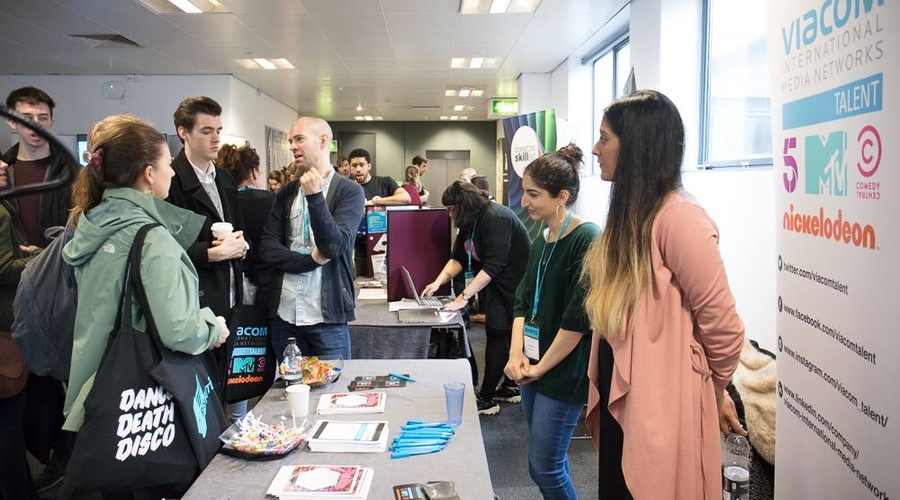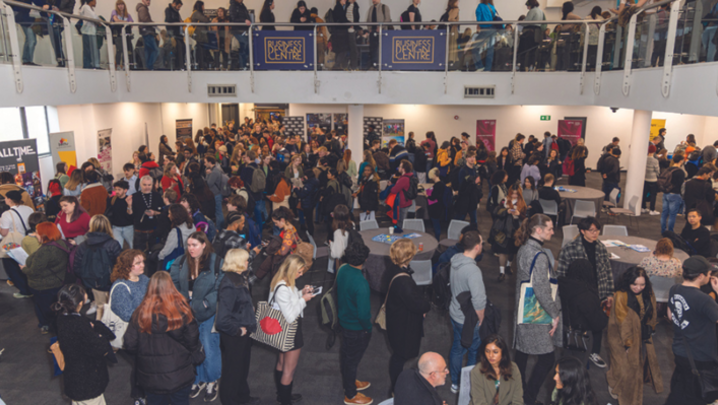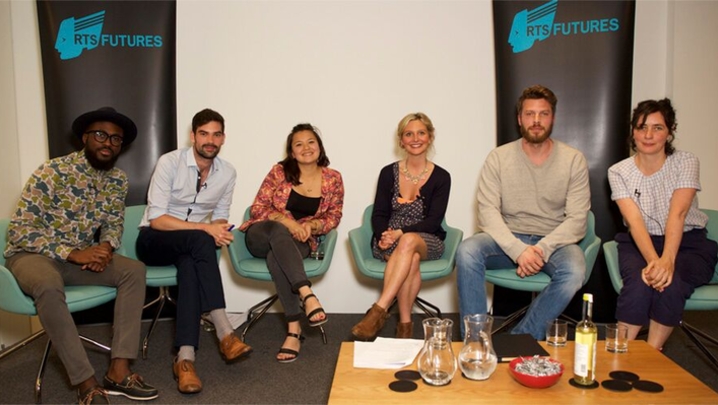Matthew Bell reports from RTS Futures’ most successful careers fair to date
More than 800 people attended RTS Futures’ most successful careers fair yet. Eight sessions during the day featured some of television’s biggest names as well as its rising talent.
More than 30 broadcasters, indies and industry bodies took stands in the exhibition hall, offering the inside track to the telly hopefuls.
TV magician Dynamo and ITV News presenter Charlene White also made guest appearances.
Some 900 tickets were sold for the event, which was held in Islington, London, on 1 February – with another 400 on the waiting list.
During the first session, a panel of RTS Awards winners revealed the secrets of their success. “I always try to work on programmes that I would want to watch,” said Shine creative director Tim Whitwell, who developed Channel 4’s The Island with Bear Grylls.
He added that, regardless of genre, successful shows “were all about telling stories with strong characters”.
Offering advice to the young talent in the room, Whitwell said: “Anyone can be a film-maker now [with a smart phone] – you’ve got to get on with it.”
Rob Hifle, whose company BDH won an RTS Craft Award last year for the digital effects on BBC Two science series Countdown to Life, said: “I put our success down to staying small and keeping the [ability] to work on what you want.
“I’m always trying to do something different, and you want to be commissioned to do something new and fresh,” he continued, before warning that “the TV industry is all about bums on seats, so, if [something works], it wants to repeat it”.
“Get ready for your TV job” was aimed at the television novice. In this session, the MD of TV jobs website The Unit List, Jude Winstanley, nailed some of the common myths about breaking into telly. “‘It’s all about who you know if you want to get into TV’ – that’s a big fat lie,” she said.
Winstanley stressed the need for professionalism, especially in CVs and on social media.
“Let’s make sure we’re presenting the best of ourselves,” she said. “If there are [embarrassing] things [on the internet] about you, you might want to do a bit of housekeeping.”
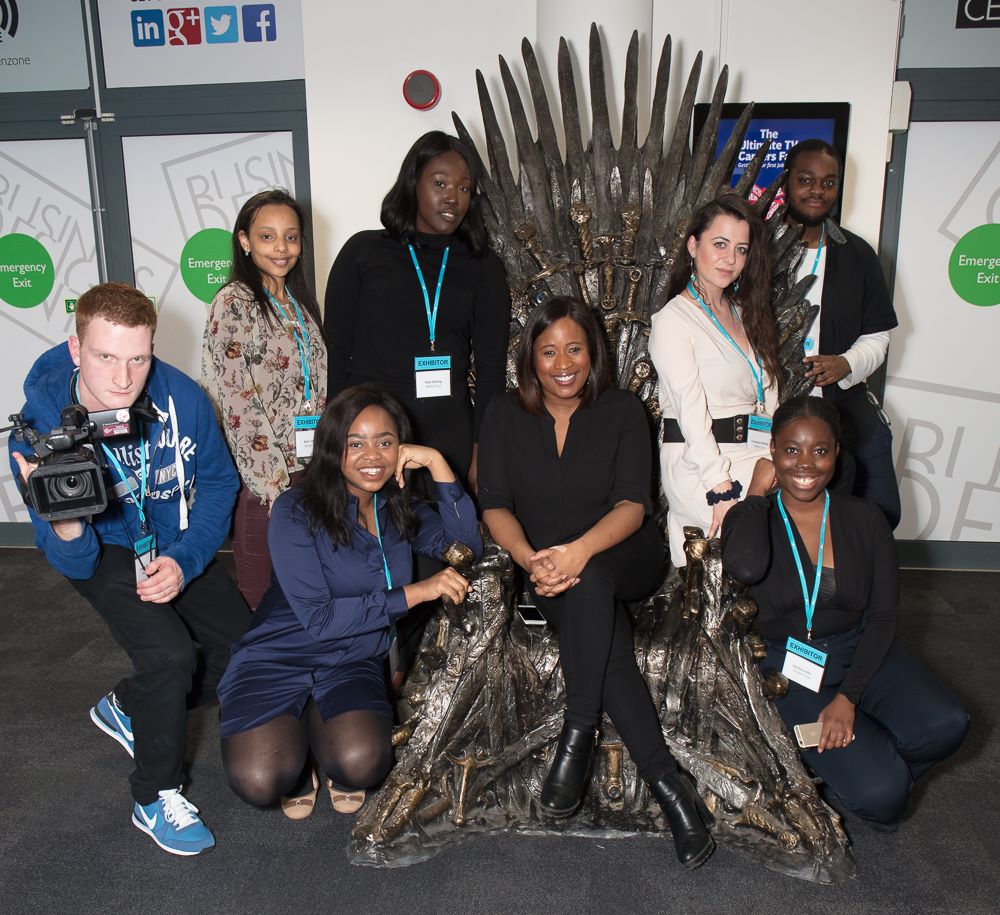
RTS Futures Chair Donna Taberer hosted a session on interview tips that included two mock interviews, one good, one bad, with actor Elliot Blagden playing the interviewee.
Breaking into TV remains tough but at least aspirants are now competing on a level playing field. “It’s a much more democratic industry now,” argued Taberer. “Ten years ago, television was more nepotistic.”
Beejal-Maya Patel, a series producer who has worked on the Channel 4 show Educating Essex, said that she looks to hire “people who are enthusiastic and passionate about television”.
BBC head of talent Donald-Iain Brown advised interviewees: “Be honest about yourself, your passions and experience. Don’t be a bullshitter – we will find you out.”
Warning against coming across as “arrogant” in interviews, he added: “This industry is built on relationships – you don’t need a particular qualification to get into it, but the ability to work with people and build relationships [is key].
“You also need to stand out from the crowd. We’re looking more and more for people who can self-shoot.”
Experience, though, can be gained outside the industry, added Taberer. “In TV, we like people with a strong work ethic, but it doesn’t have to be television related,” she said.
A session hosted by the Indie Training Fund offered insights into the work of the TV researcher. “The keys are to show that you’re keen and learn to do all the basics,” advised Betty TV researcher Chitsi Kurangwa.
The final session of the day assembled a panel of producers to discuss spotting talent and how newcomers can bring themselves to the attention of TV execs.
Channel 5 executive producer Sarah Wood advised: “Make contacts and nurture them, but don’t pester or become a stalker.”
Nevertheless, some flattery can help. “It’s an industry full of big egos – everyone thinks they’re great,” said former RTS Futures Chair Camilla Lewis.
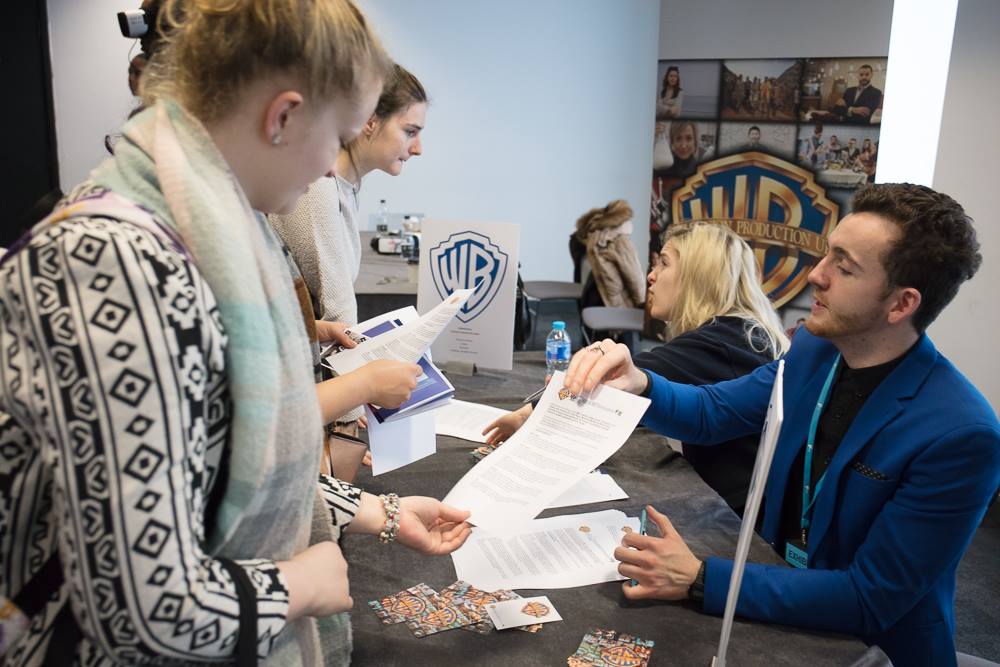
Securing work experience can add to a sketchy CV but, advised FremantleMedia UK head of talent Emily Gale, it should last for only two weeks without pay (but with expenses). “It’s wrong if people are working long term for free,” she said.
If you secure an interview for a paid position, continued Gale, prepare thoroughly. “I look for people who can tell me stuff,” she said. Too often, she added, there is an “awful tumbleweed moment” when interviewees are unable to discuss what was on TV the previous day.
Earlier in the day, Taberer had noted that, at interviews, “people fall into the trap of talking about shows they liked a long, long time ago, or Game of Thrones”. Interviewers want to discuss neither.
Knockbacks are frequent in TV. Blast! Films talent manager Edd Buckley recalled one disastrous interview, where he was told: “I don’t think you’re ready for this role.” “It was awful, but I wasn’t ready,” admitted Buckley.
But when an opportunity finally comes knocking, added Wood: “Show some enthusiasm – I don’t want to work with someone who’s moody or can’t be arsed.”
The RTS Futures event ‘The Ultimate TV Careers Fair: Getting your first job in TV’ was held at the Business Design Centre in London on 1 February. It was supported by Creative Skillset and the Edinburgh International Television Festival.
How to develop and pitch ideas
Ideas are the lifeblood of television – and for TV newcomers a potential route into the industry. ‘The biggest short cut to get people to take notice of you is to have ideas,’ said Curve Media CEO Camilla Lewis.
Generating ideas is considerably less of a problem than getting them commissioned. ‘A TV creative has 10 great ideas a week,’ said David Flynn, the co-founder of Youngest Media who created Channel 4 game show The Million Pound Drop and co-created BBC One quiz Pointless.
‘I read a lot, watch a lot of television and talk to a lot of people,’ revealed BBC assistant commissioning editor for entertainment Sohail Shah, who added that there was no shame in borrowing from other TV shows.
‘You don’t know when an idea is going to hit you,’ said Flynn. ‘I’m OCD about having a notebook with me at all times.’ He added that the trick was ‘to find a way of distinguishing your idea from everybody else’s’.
Shah agreed, revealing that he received ‘a lot of similar ideas at the same time’. ‘It’s because we all have the same influences,’ said Flynn.
Caroline Sciama, development assistant producer at The Garden, recommended ‘asking people who don’t work in the industry – they watch TV, too’.
Before pitching to a broadcaster, ideas need a development stage. ‘You only have one chance to [pitch] a show,’ warned Flynn.
The original idea for Pointless was little more than a quiz in which the least-obvious answer won.
After six weeks’ development, it had become a format and, only at the last minute, gained a title.
The panel suggested that a pitch generally needed a good title; a short, clear description; and a beginning and an end.
They might also include an online element, such as an extension to Facebook Live, although Sciama warned: ‘Do this sparingly and only when it adds to a programme.’
‘Certain shows need a lot of fleshing out; others just a top line,’ said Shah.

